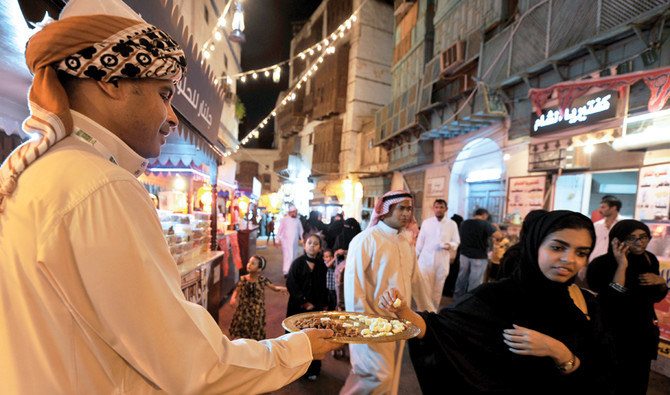
- ARAB NEWS
- 05 Jul 2025

One of the most popular Ramadan activities that has become a tradition is organizing bazaars. These bazaars are usually markets for homemade products and designs by women, such as handicrafts, foods, clothes and accessories. It is a great idea to showcase these products in one place, and people are generally in a charitable mood in Ramadan so they buy to support these women in their small businesses.
Some of these bazaars have become glamorous, much-anticipated annual events, boasting large numbers of booths selling different products, dazzling opening ceremonies and sideshows. Marketing these events is important, of course, especially when there is competition to attract visitors to the bazaars, which are held almost daily throughout the month. But it seems that, in some cases, the marketing and the glamour overshadows the real purpose of having these bazaars.
The cost of renting booth spaces has become extravagant, which means products are sold at high prices to cover the expenses. The organizers themselves are renting the hall for the bazaar and that price is high, in addition to all the other setting up and running expenses, as well as advertisements; so there is a trickle-down effect, with each trying to cover their expenses.
While attending a few that were held in Jeddah last week, I noticed that there was no difference in price between the products sold at the bazaar and those sold in regular malls or shopping areas, which to me defied the purpose of a bazaar. Furthermore, as several were held at the same time, many of those renting a space complained that they were unable to break even because there were barely enough shoppers. Most of the visitors seemed to be there just to walk around and see and be seen, without buying much or even anything at all.
It is nice to see our young people choosing to roll up their sleeves and try to earn a living instead of sitting idly at home waiting for a job
Yes, people are more willing to give in Ramadan, so it is a good time to help home businesses, and bazaars are among the few opportunities to showcase and market such products. However, the time period is short, with almost all bazaars taking place during the second and third weeks of Ramadan and, after going to one or two of them, people are reluctant to go to more as they already barely have the time and energy, especially when the products are almost the same. Furthermore, there are only a few locations that are suitable for bazaars, which means they are not accessible or convenient to a wide range of shoppers. Instead of cramming all the bazaars into two weeks, it would be better to spread them out throughout the year and in various locations, with different setups and attractions for families.
On the other hand, Jeddah Municipality has licensed hundreds of street vendors (basta) during Ramadan. They are stationed in different locations around the city, most of them selling food and beverages prepared on the spot, and they are mostly run by young Saudi men and women. Some of the pop-up food trucks are licensed to operate throughout the year at specific locations. I’m actually impressed and happy with the entrepreneurial and hands-on spirit of these youths. With the unemployment rate at 12.7 percent in the fourth quarter of 2018, according to the General Authority of Statistics (6.6 percent for Saudi males and 32.5 percent for females), it is nice to see our young people choosing to roll up their sleeves and try to earn a living instead of sitting idly at home waiting for a job. They are thus breaking the stereotype that our youths are lazy and prefer office jobs; in fact, many have started their own businesses. Nevertheless, there are also those who claim to be looking for work but are not putting in the effort or commitment.
Four years ago, the Jeddah Chamber of Commerce launched an annual Basta Market, set up on a plot of land and open every Friday for a few months of the year. It has been fairly successful, offering a variety of products and attracting different segments of society, especially as it features activities for children so it is a good family outing. Having several locations for such markets would make it more convenient for both the businesses and buyers. Such endeavors are good for encouraging very small and small businesses, as long as officials do not impose high fees and burdensome regulations.
Small and medium-sized enterprises (SMEs) are the backbone of the economy of any country. They usually represent around 90 percent of businesses. The Secretary General of the National Entrepreneurship Initiative recently stated that 99 percent of the Saudi private sector consists of SMEs and they absorb about 70 percent of the country’s workforce. While the Saudization drive aims to provide more job opportunities in the public and private sectors, there is also a need to help home and small entrepreneurs sustain their businesses by providing them with incentives, the means to develop their skills and knowledge, and access to markets. These entrepreneurs are of different ages, backgrounds and skills: While some are young creative talents who are technologically savvy and active on social media, others are middle-aged and older ladies working on their handicrafts and food products to support their families. But, in most cases, they lack funding, management skills and marketing. They need a business-friendly environment.
Maha Akeel is a Saudi writer. She is based in Jeddah. Twitter: @MahaAkeel1